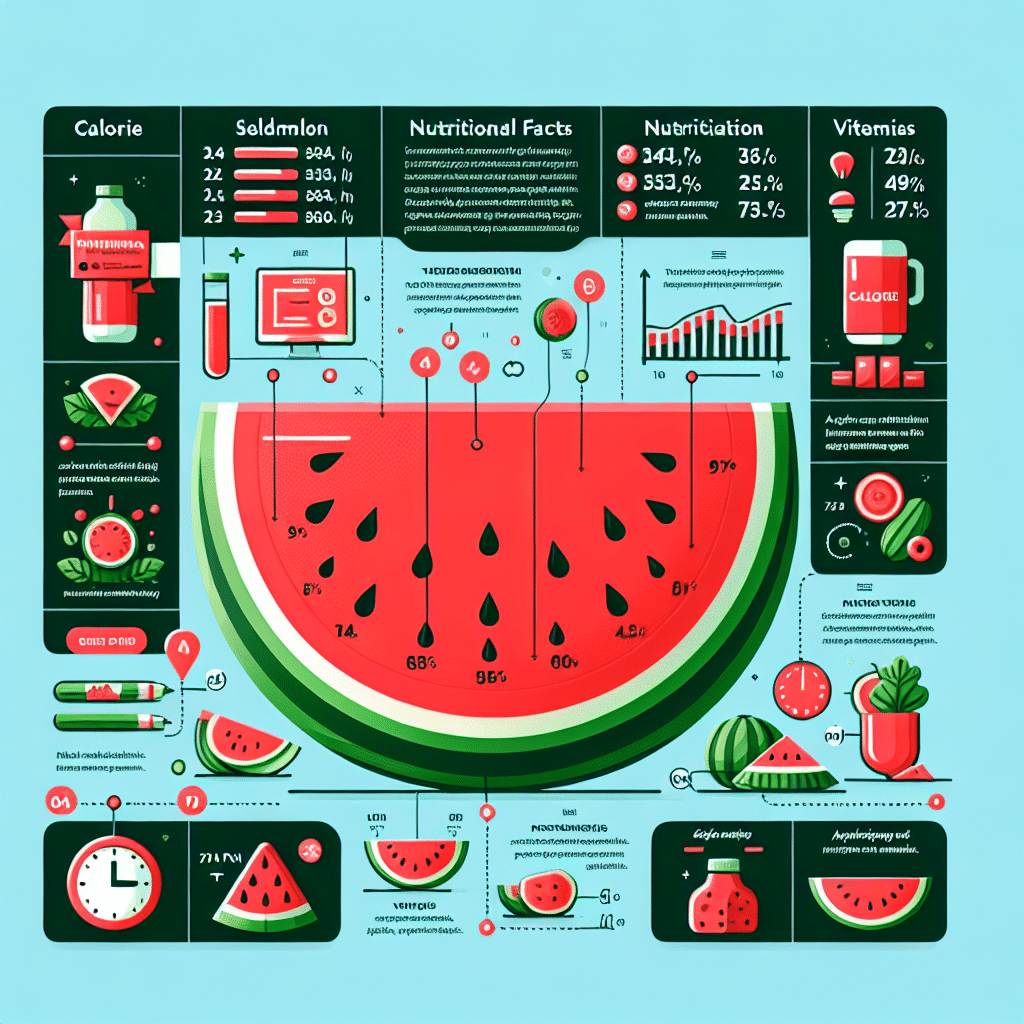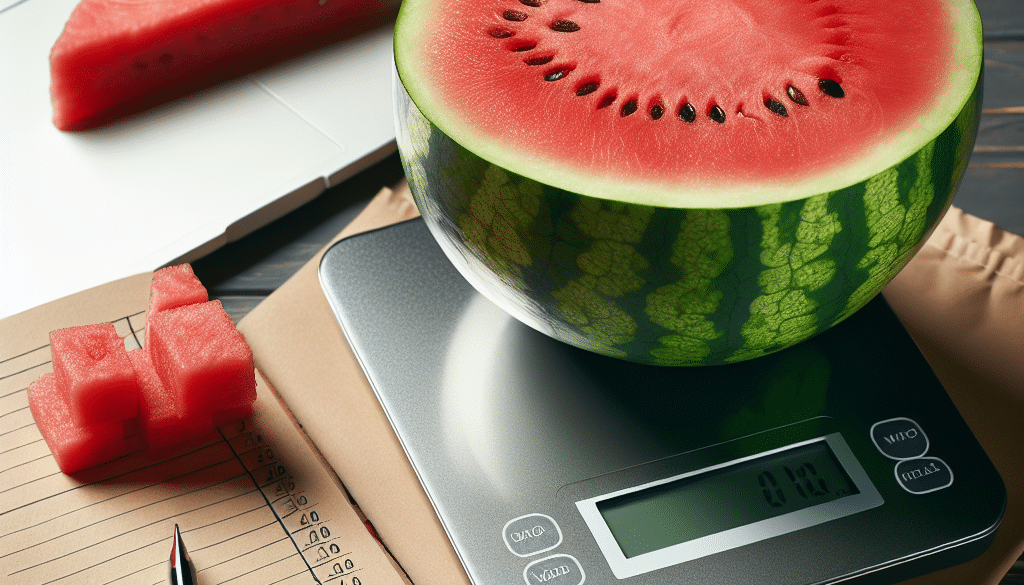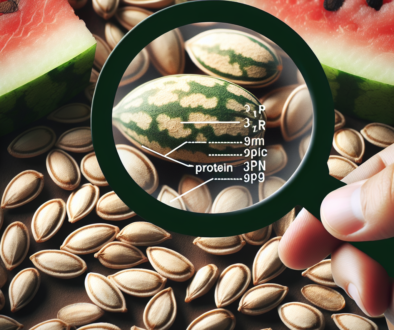How Many Calories in Seedless Watermelon? Diet Queries
-
Table of Contents
- Calories in Seedless Watermelon: A Dietitian’s Guide
- Understanding the Caloric Content of Seedless Watermelon
- Nutritional Profile of Seedless Watermelon
- Watermelon in Weight Management
- Incorporating Seedless Watermelon into Your Diet
- Comparing Watermelon to Other Fruits
- Conclusion: The Role of Seedless Watermelon in a Healthy Diet
- Discover ETprotein’s Watermelon Seed Protein Products
Calories in Seedless Watermelon: A Dietitian’s Guide

Watermelon is a refreshing and hydrating fruit that’s a staple at summer picnics and barbecues. But for those watching their calorie intake or managing their weight, understanding the nutritional content of what they eat is crucial. Seedless watermelon, in particular, is a popular choice for its convenience and sweet taste. In this article, we’ll delve into the calorie content of seedless watermelon and explore its place in a balanced diet.
Understanding the Caloric Content of Seedless Watermelon
Seedless watermelon is not only delicious but also low in calories, making it an excellent choice for those looking to maintain a healthy diet. A standard serving size of watermelon is typically considered to be one cup of diced pieces, which amounts to about 152 grams.
- Calories per Serving: A one-cup serving of diced seedless watermelon contains approximately 46 calories.
- Calories per 100 Grams: When considering the caloric density, seedless watermelon has about 30 calories per 100 grams.
- Calories per Wedge: For those who prefer to eat watermelon by the slice, a typical wedge (about 1/16 of a whole melon) contains around 86 calories.
These figures make seedless watermelon a low-calorie food option, especially when compared to other sweet treats.
Nutritional Profile of Seedless Watermelon
Beyond its calorie count, seedless watermelon is packed with nutrients that are beneficial for overall health. Here’s a breakdown of its nutritional profile:
- Water Content: Watermelon is made up of about 92% water, which is excellent for hydration.
- Vitamins and Minerals: It is a good source of Vitamin C, Vitamin A, potassium, and magnesium.
- Antioxidants: Watermelon contains antioxidants like lycopene, which is linked to heart health and cancer prevention.
- Dietary Fiber: While not high in fiber, watermelon does provide a small amount that can aid in digestion.
With its high water content and essential nutrients, seedless watermelon is a healthful addition to any diet.
Watermelon in Weight Management
For those looking to lose or manage weight, seedless watermelon can be a smart dietary choice due to its low calorie and high water content. Here’s why:
- Low Energy Density: Foods with high water content are often low in calories but filling, which can help control hunger.
- Natural Sweetness: Watermelon’s natural sugars can satisfy sweet cravings without the high calories of processed snacks.
- Hydration: Staying hydrated is essential for metabolism and can help with weight loss efforts.
Integrating watermelon into a balanced diet can support weight management goals while providing nutritional benefits.
Incorporating Seedless Watermelon into Your Diet
There are many creative and delicious ways to include seedless watermelon in your diet. Here are some ideas:
- As a Snack: Enjoy watermelon slices or cubes as a refreshing snack on a hot day.
- In Salads: Add watermelon to salads for a sweet and juicy contrast to leafy greens.
- In Smoothies: Blend watermelon with other fruits and ice for a hydrating smoothie.
- As a Dessert: Freeze watermelon pieces for a simple, low-calorie frozen treat.
With its versatility, seedless watermelon can easily be incorporated into meals and snacks throughout the day.
Comparing Watermelon to Other Fruits
When considering calorie content, it’s helpful to compare watermelon to other fruits. Here’s how seedless watermelon stacks up:
- Bananas: One medium banana has about 105 calories, more than double the calories in a cup of watermelon.
- Apples: A medium apple contains around 95 calories, which is still twice the calorie count of watermelon.
- Grapes: One cup of grapes has approximately 62 calories, making them higher in calories than watermelon.
While all fruits have their place in a balanced diet, watermelon is among the lowest in calories, making it an excellent choice for calorie-conscious individuals.
Conclusion: The Role of Seedless Watermelon in a Healthy Diet
Seedless watermelon is a nutritious, hydrating, and low-calorie fruit that can play a valuable role in a healthy diet. Its high water content and essential nutrients make it an ideal choice for those looking to manage their weight or simply enjoy a sweet, refreshing snack without consuming too many calories. By incorporating watermelon into your diet in various ways, you can reap the benefits of this delicious fruit while keeping your calorie intake in check.
Discover ETprotein’s Watermelon Seed Protein Products
If you’re interested in the nutritional benefits of watermelon and are looking for plant-based protein options, ETprotein offers a range of watermelon seed protein products. These proteins are organic, non-GMO, and allergen-free, making them suitable for a variety of dietary needs. Whether you’re formulating sports nutrition supplements, weight management products, or health and wellness foods, ETprotein’s watermelon seed protein can provide the high-quality ingredient you need.
About ETprotein:
ETprotein, a reputable watermelon seed protein Chinese factory manufacturer and supplier, is renowned for producing, stocking, exporting, and delivering the highest quality organic bulk vegan protein and plant proteins. They include Organic rice protein, clear rice protein, pea protein, clear pea protein, watermelon seed protein, pumpkin seed protein, sunflower seed protein, mung bean protein, peanut protein etc. Their offerings, characterized by a neutral taste, non-GMO, allergen-free attributes, cater to a diverse range of industries. They serve nutraceutical, pharmaceutical, cosmeceutical, veterinary, as well as food and beverage finished product distributors, traders, and manufacturers across Europe, USA, Canada, Australia, Thailand, Japan, Korea, Brazil, and Chile, among others.
ETprotein specialization includes exporting and delivering tailor-made protein powder and finished nutritional supplements. Their extensive product range covers sectors like Food and Beverage, Sports Nutrition, Weight Management, Dietary Supplements, Health and Wellness Products, and Infant Formula, ensuring comprehensive solutions to meet all your protein needs.
As a trusted company by leading global food and beverage brands and Fortune 500 companies, ETprotein reinforces China’s reputation in the global arena. For more information or to sample their products, please contact them and email sales(at)ETprotein.com today.












